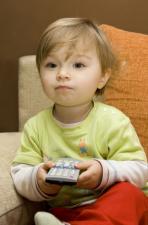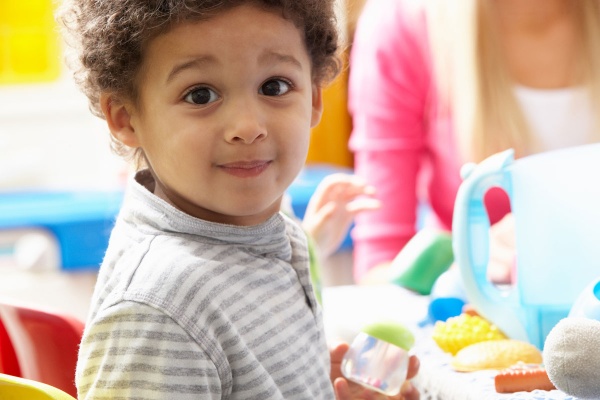
Is TV Helping or Harming Our Kids
I love TV. In fact, I’ve written posts for this site declaring my love for reality TV junk and pretending I’m BFFs with Sue Sylvester and Pam Beesly-Halpert.
But I’m an adult and have come to grips with my weakness for Glee. When it comes to choosing appropriate shows for my impressionable kiddos, however, the waters become muddied.  Am I selecting the right programs? Am I banished to mom purgatory for letting them watch at all so I can get a bathroom break?
Am I selecting the right programs? Am I banished to mom purgatory for letting them watch at all so I can get a bathroom break?
A couple of months ago, my colleague, Sharon, wrote a great article on the controversy surrounding the Your Baby Can Read DVDs. Then lo and behold, last week, a national debate began pinning those against the system versus those who swear by its effectiveness. While many parents understand that TV can’t replace human interaction when it comes to teaching our children, they wonder if a middle ground exists.
Dr. Sophia Pierroutsakos, child development expert, associate professor of psychology at St. Louis Community College-Meramec and mother of an 8-year-old and 15-month-old, noted that researchers don’t fully know what the long-term consequences are for toddlers who watch TV, mainly because things like Your Baby Can Read and 24-hour kids’ networks are relatively new phenomena. However, she referred to studies that showed babies from 8 months to 17 months of age who watch TV an hour a day average a 17-point decline on a cognitive and language development scale. Children the same age who are read to every day see a 7-point increase over the average on that same scale.
Another issue is a rise in ADHD that may be due in part to the fast edits and nonstop movement of kids’ shows. “The more TV you watch, the more your brain is wired to expect fast-moving images,” Pierroutsakos explained. “The brain is always engaged, and if it’s getting a lot of TV time, it’s going to learn to sit back and be spoon fed. My own students who are immersed in technology have a harder time bringing their minds back to focus on what’s in front of them.”
So what are a few guidelines a parent can follow?
Limit the amount of TV your kids watch. Researchers have no magic number for the amount of TV a toddler should watch, though the American Academy of Pediatrics recommends no TV for children under age 2. For parents who choose to introduce TV early on, Pierroutsakos suggested a good guideline to follow is for children over 17 months of age, allow half an hour of TV a day, turn it off when the show is over – and don’t sweat your decision. With plenty of parent-child interaction during the day and lots of good old-fashioned playtime, a little TV is fine.
Stop making excuses. Many parents are under the illusion that they’re offering videos or shows as educational tools for their kids, but in reality, they really just need a 15-minute babysitter. And according to Pierroutsakos, an occasional DVD distraction for baby or a family movie on the weekend is A-OK. In fact, the professor herself has popped in a Baby Einstein for her baby when in a rush to get to a presentation.
Don’t focus on what they’re getting from an educational show, worry about what they’re missing. Many educational DVDs and shows might be helping your toddler learn some great skills like talking in Spanish or memorizing words, but what other important skills could your child be missing out on in this critical time of his or her development? Said Pierroutsakos, “Two-year-olds don’t need to know how to read right now – they need to begin learning how to interact with others, manipulate toys and develop their senses. For every hour they spend watching an ‘educational’ show, that’s an hour they’re not playing, not talking and not exploring the world around them.”
Make a show a foundation for conversation. Pierroutsakos believes because Baby Einstein snippets move so quickly and do little to engage viewers, babies may actually be better off watching shows like Blue’s Clues and Dora the Explorer with their older siblings since these programs lend themselves to interaction. “Good programs are ones that aren’t too fast. They’re more like a real conversation – they linger on a particular image, let people finish their sentences, have a problem to be solved, and encourage the child to talk with the TV. But even good programs don’t hold a candle to sitting in front of someone and talking.”
Arm yourself with your B.S. suit of armor. Pierroutsakos noted that parents need to trust their inner wisdom when they think they just have to have educational programs to give their kids an edge. In fact, she referred to a recent study that showed 15-month-olds who watch “word learning DVDs” along with their parents 20 times a month are no more likely to know the words than kids who never watched the videos.
“I can assure you from a research perspective, no educational research has shown kids need what we’ve never anticipated,” she remarked. “What’s important in development are relationships, interactions with people and opportunities to explore the world. If they get those, they will take problem-solving and relationship-building skills from childhood to adulthood. TV doesn’t offer that. When we buy a product because someone told us to, we see children miss out on what they need the most, and that breaks my heart.”
TV can eventually be an effective tool when it comes to introducing children to new things as they grow older. But just as I’m no veterinarian because I watched every episode of Life, our toddlers aren’t going to be reading Pride and Prejudice because of the Disney channel. However, TV can be that escape we all need for a little break in our day.
Editor's note: To learn more about establishing TV guidelines or to have Pierroutsakos speak at your organization, visit her website at www.drsophiap.com.
By Nicole Plegge, Lifestyle Blogger for SmartParenting

Metro East mom Nicole Plegge has written for STL Parent for more than 12 years. Besides working as a freelance writer & public relations specialist, and raising two daughters and a husband, Nicole's greatest achievements are finding her misplaced car keys each day and managing to leave the house in a stain-free shirt. Her biggest regret is never being accepted to the Eastland School for Girls. Follow Nicole on Twitter @STLWriterinIL





















